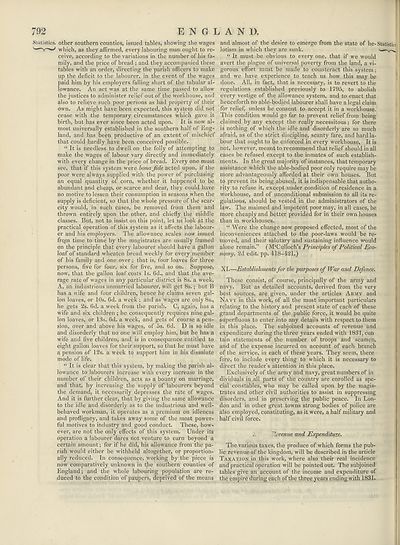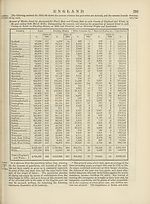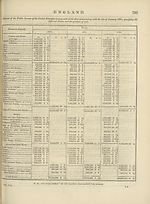Encyclopaedia Britannica > Volume 8, DIA-England
(804) Page 792
Download files
Complete book:
Individual page:
Thumbnail gallery: Grid view | List view

ENGLAND.
792
Statistics, other southern counties, issued tables, showing the wages
which, as they affirmed, every labouring man ought to re¬
ceive, according to the variations in the number of his fa¬
mily, and the price of bread ; and they accompanied these
tables with an order, directing the parish officers to make
up the deficit to the labourer, in the event of the wages
paid him by his employers falling short of the tabular al¬
lowance. An act was at the same time passed to allow
the justices to administer relief out of the workhouse, and
also to relieve such poor persons as had property of their
own. As might have been expected, this system did not
cease with the temporary circumstances which gave it
birth, but has ever since been acted upon. It is now al¬
most universally established in the southern half of Eng¬
land, and has been productive of an extent of mischief
that could hardly have been conceived possible.
“ It is needless to dwell on the folly of attempting to
make the wages of labour vary directly and immediately
with every change in the price of bread. Every one must
see, that if this system were bona fide acted upon, if the
poor were always supplied with the power of purchasing
an equal quantity of corn, whether it happened to be
abundant and cheap, or scarce and dear, they could have
no motive to lessen their consumption in seasons when the
supply is deficient, so that the whole pressure of the scar¬
city would, in such cases, be removed from them and
thrown entirely upon the other, and chiefly the middle
classes. But, not to insist on this point, let us look at the
practical operation of this system as it affects the labour¬
er and his employers. The allowance scales now issued
from time to time by the magistrates are usually framed
on the principle that every labourer should have a gallon
loaf of standard wheaten bread weekly for every member
of his family and one over ; that is, four loaves for three
persons, five for four, six for five, and so on. Suppose,
now, that the gallon loaf costs Is. 6d., and that the ave¬
rage rate of wages in any particular district is 8s. a week,
A, an industrious unmarried labourer, will get 8s.; but B
has a wife and four children, hence he claims seven gal¬
lon loaves, or 10s. 6d. a week ; and as wages are only 8s.,
he gets 2s. 6d. a week from the parish. C, again, has a
wife and six children ; he consequently requires nine gal¬
lon loaves, or 13s. 6d. a week, and gets of course a pen¬
sion, over and above his wages, of 5s. fid. D is so idle
and disorderly that no one will employ him, but he has a
wife and five children, and is in consequence entitled to
eight gallon loaves for their support, so that he must have
a pension of 12s. a week to support him in his dissolute
mode of life.
“ It is clear that this system, by making the parish al¬
lowance to labourers increase with every increase in the
number of their children, acts as a bounty on marriage,
and that, by increasing the supply of labourers beyond
the demand, it necessarily depresses the rate of wages.
And it is further clear, that by giving the same allowance
to the idle and disorderly as to the industrious and well-
behaved workman, it operates as a premium on idleness
and profligacy, and takes away some of the most power¬
ful motives to industry and good conduct. These, how¬
ever, are not the only effects of this system. Under its
operation a labourer dares not venture to earn beyond a
certain amount; for if he did, his allowance from the pa¬
rish would either be withheld altogether, or proportion¬
ally reduced. In consequence, working by the piece is
now comparatively unknown in the southern counties of
England; and the whole labouring population are re¬
duced to the condition of paupers, deprived of the means
and almost of the desire to emerge from the state of he- Statistic;
lotism in which they are sunk.
“ It must be obvious to every one, that if we would
avert the plague of universal poverty from the land, a vi¬
gorous effort must be made to counteract this system;
and we have experience to teach us how this may be
done. All, in fact, that is necessary, is to revert to the
regulations established previously to 1795, to abolish
every vestige of the allowance system, and to enact that
henceforth no able-bodied labourer shall have a legal claim
for relief, unless he consent to accept it in a workhouse.
This condition would go far to prevent relief from being
claimed by any except the really necessitous; for there
is nothing of which the idle and disorderly are so much
afraid, as of the strict discipline, scanty fare, and hard la¬
bour that ought to be enforced in every workhouse,. It is
not, however, meant to recommend that relief should in all
cases be refused except to the inmates of such establish¬
ments. In the great majority of instances, that temporary
assistance which the able-bodied poor only require maybe
more advantageously afforded at their own houses. But
to prevent its being abused, it is indispensable that autho¬
rity to refuse it, except under condition of residence in a
workhouse, and of unconditional submission to all its re¬
gulations, should be vested in the administrators of the
law. The maimed and impotent poor may, in all cases, be
more cheaply and better provided for in their own houses
than in workhouses.
“ Were the change now proposed effected, most of the
inconveniences attached to the poor-laws would be re¬
moved, and their salutary and sustaining influence would
alone remain.” (iVECulloch’s Principles of Political Eco¬
nomy, 2d edit. pp. 418-421.)
XI.—Establishments for the purposes of War and Defence.
These consist, of course, principally of the army and
navy. But as detailed accounts, derived from the very
best sources, are given, under the articles Army and
Navy in this work, of all the most important particulars
relating to the history and present state of each of these
grand departments of the public force, it would be quite
superfluous to enter into any details with respect to them
in this place. The subjoined accounts of revenue and
expenditure during the three years ended with 1831, con
tain statements of the number of troops and seamen,
and of the expense incurred on account of each branch
of the service, in each of these years. They seem, there
fore, to include every thing to which it is necessary to
direct the reader’s attention in this place.
Exclusively of the army and navy, great numbers of in
dividuals in all parts of the country are enrolled as spe¬
cial constables, who may be called upon by the magis¬
trates and other civil authorities to assist in suppressing
disorders, and in preserving the public peace. In Lon¬
don and in other great towns strong bodies of police are
also employed, constituting, as it were, a half military and
half civil force.
i. Revenue and Expenditure.
The various taxes, the produce of which forms the pub¬
lic revenue of the kingdom, will be described in the article
Taxation in this work, where also their real incidence
and practical operation will be pointed out. The subjoined
tables give an account of the income and expenditure of
the empire during each of the three years ending with 1831.
792
Statistics, other southern counties, issued tables, showing the wages
which, as they affirmed, every labouring man ought to re¬
ceive, according to the variations in the number of his fa¬
mily, and the price of bread ; and they accompanied these
tables with an order, directing the parish officers to make
up the deficit to the labourer, in the event of the wages
paid him by his employers falling short of the tabular al¬
lowance. An act was at the same time passed to allow
the justices to administer relief out of the workhouse, and
also to relieve such poor persons as had property of their
own. As might have been expected, this system did not
cease with the temporary circumstances which gave it
birth, but has ever since been acted upon. It is now al¬
most universally established in the southern half of Eng¬
land, and has been productive of an extent of mischief
that could hardly have been conceived possible.
“ It is needless to dwell on the folly of attempting to
make the wages of labour vary directly and immediately
with every change in the price of bread. Every one must
see, that if this system were bona fide acted upon, if the
poor were always supplied with the power of purchasing
an equal quantity of corn, whether it happened to be
abundant and cheap, or scarce and dear, they could have
no motive to lessen their consumption in seasons when the
supply is deficient, so that the whole pressure of the scar¬
city would, in such cases, be removed from them and
thrown entirely upon the other, and chiefly the middle
classes. But, not to insist on this point, let us look at the
practical operation of this system as it affects the labour¬
er and his employers. The allowance scales now issued
from time to time by the magistrates are usually framed
on the principle that every labourer should have a gallon
loaf of standard wheaten bread weekly for every member
of his family and one over ; that is, four loaves for three
persons, five for four, six for five, and so on. Suppose,
now, that the gallon loaf costs Is. 6d., and that the ave¬
rage rate of wages in any particular district is 8s. a week,
A, an industrious unmarried labourer, will get 8s.; but B
has a wife and four children, hence he claims seven gal¬
lon loaves, or 10s. 6d. a week ; and as wages are only 8s.,
he gets 2s. 6d. a week from the parish. C, again, has a
wife and six children ; he consequently requires nine gal¬
lon loaves, or 13s. 6d. a week, and gets of course a pen¬
sion, over and above his wages, of 5s. fid. D is so idle
and disorderly that no one will employ him, but he has a
wife and five children, and is in consequence entitled to
eight gallon loaves for their support, so that he must have
a pension of 12s. a week to support him in his dissolute
mode of life.
“ It is clear that this system, by making the parish al¬
lowance to labourers increase with every increase in the
number of their children, acts as a bounty on marriage,
and that, by increasing the supply of labourers beyond
the demand, it necessarily depresses the rate of wages.
And it is further clear, that by giving the same allowance
to the idle and disorderly as to the industrious and well-
behaved workman, it operates as a premium on idleness
and profligacy, and takes away some of the most power¬
ful motives to industry and good conduct. These, how¬
ever, are not the only effects of this system. Under its
operation a labourer dares not venture to earn beyond a
certain amount; for if he did, his allowance from the pa¬
rish would either be withheld altogether, or proportion¬
ally reduced. In consequence, working by the piece is
now comparatively unknown in the southern counties of
England; and the whole labouring population are re¬
duced to the condition of paupers, deprived of the means
and almost of the desire to emerge from the state of he- Statistic;
lotism in which they are sunk.
“ It must be obvious to every one, that if we would
avert the plague of universal poverty from the land, a vi¬
gorous effort must be made to counteract this system;
and we have experience to teach us how this may be
done. All, in fact, that is necessary, is to revert to the
regulations established previously to 1795, to abolish
every vestige of the allowance system, and to enact that
henceforth no able-bodied labourer shall have a legal claim
for relief, unless he consent to accept it in a workhouse.
This condition would go far to prevent relief from being
claimed by any except the really necessitous; for there
is nothing of which the idle and disorderly are so much
afraid, as of the strict discipline, scanty fare, and hard la¬
bour that ought to be enforced in every workhouse,. It is
not, however, meant to recommend that relief should in all
cases be refused except to the inmates of such establish¬
ments. In the great majority of instances, that temporary
assistance which the able-bodied poor only require maybe
more advantageously afforded at their own houses. But
to prevent its being abused, it is indispensable that autho¬
rity to refuse it, except under condition of residence in a
workhouse, and of unconditional submission to all its re¬
gulations, should be vested in the administrators of the
law. The maimed and impotent poor may, in all cases, be
more cheaply and better provided for in their own houses
than in workhouses.
“ Were the change now proposed effected, most of the
inconveniences attached to the poor-laws would be re¬
moved, and their salutary and sustaining influence would
alone remain.” (iVECulloch’s Principles of Political Eco¬
nomy, 2d edit. pp. 418-421.)
XI.—Establishments for the purposes of War and Defence.
These consist, of course, principally of the army and
navy. But as detailed accounts, derived from the very
best sources, are given, under the articles Army and
Navy in this work, of all the most important particulars
relating to the history and present state of each of these
grand departments of the public force, it would be quite
superfluous to enter into any details with respect to them
in this place. The subjoined accounts of revenue and
expenditure during the three years ended with 1831, con
tain statements of the number of troops and seamen,
and of the expense incurred on account of each branch
of the service, in each of these years. They seem, there
fore, to include every thing to which it is necessary to
direct the reader’s attention in this place.
Exclusively of the army and navy, great numbers of in
dividuals in all parts of the country are enrolled as spe¬
cial constables, who may be called upon by the magis¬
trates and other civil authorities to assist in suppressing
disorders, and in preserving the public peace. In Lon¬
don and in other great towns strong bodies of police are
also employed, constituting, as it were, a half military and
half civil force.
i. Revenue and Expenditure.
The various taxes, the produce of which forms the pub¬
lic revenue of the kingdom, will be described in the article
Taxation in this work, where also their real incidence
and practical operation will be pointed out. The subjoined
tables give an account of the income and expenditure of
the empire during each of the three years ending with 1831.
Set display mode to:
![]() Universal Viewer |
Universal Viewer | ![]() Mirador |
Large image | Transcription
Mirador |
Large image | Transcription
Images and transcriptions on this page, including medium image downloads, may be used under the Creative Commons Attribution 4.0 International Licence unless otherwise stated. ![]()
| Encyclopaedia Britannica > Encyclopaedia Britannica > Volume 8, DIA-England > (804) Page 792 |
|---|
| Permanent URL | https://digital.nls.uk/193333457 |
|---|
| Attribution and copyright: |
|
|---|
| Description | Ten editions of 'Encyclopaedia Britannica', issued from 1768-1903, in 231 volumes. Originally issued in 100 weekly parts (3 volumes) between 1768 and 1771 by publishers: Colin Macfarquhar and Andrew Bell (Edinburgh); editor: William Smellie: engraver: Andrew Bell. Expanded editions in the 19th century featured more volumes and contributions from leading experts in their fields. Managed and published in Edinburgh up to the 9th edition (25 volumes, from 1875-1889); the 10th edition (1902-1903) re-issued the 9th edition, with 11 supplementary volumes. |
|---|---|
| Additional NLS resources: |
|

